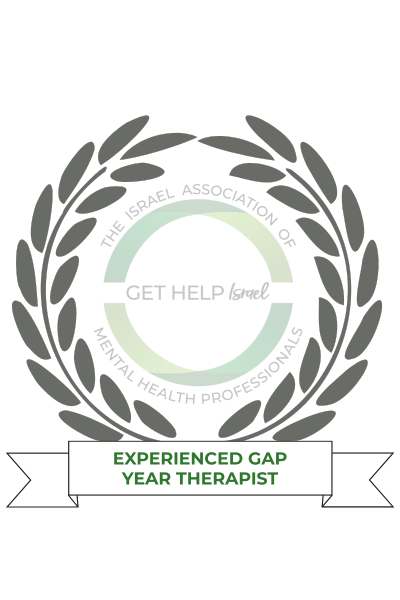Dina Kessler
Credentials
Finances
- Kanei Hagalil, Katamonim
- Jerusalem
- 26 Yonatan hachashmonai Street
- Efrat
Dina Kessler
 Verified
Verified
Credentials
Psychotherapist
MSC
Finances
350-500 NIS
None
Sliding Scale
- Kanei Hagalil, Katamonim
- Jerusalem
- 26 Yonatan hachashmonai Street
- Efrat
ABOUT THE THERAPIST
As a psychotherapist, I believe if you understand more about how your brain works, you can start to make sense of reactions, tendencies and habits, especially those that might be getting in your way. Therapy can be a place to explore the roots of those patterns and choose tools to help you navigate life more successfully. It starts with the safety created in the therapy room. Clients are often already in a place where life can feel painful and then on top of what is happening to them, their own judgements , self criticism and blame just increase that suffering. I strive to create a place where you can bring all parts of yourself and we can work to understand why those parts make sense and how to work with them from a compassionate stance. My training and strong interest is in working individually with adolescents (14 and up) and adults, especially those going through transitional periods, challenges with family or those experiencing anxiety.
Alongside my private practice, I have worked in Shana b'Aretz and gap year programs since I made aliya. This has given me a depth of experience with the unique challenges that clients can face during the year in Israel, and the many opportunities for growth. In addition to being trained in classical talk therapy, I have learned and incorporated a myriad of eclectic and expressive modalities such as DBT, IFS, mindfulness, visual imagery, art directives and somatic work, which I have found to be enormously helpful in my work with clients.
QUALIFICATIONS
MSC
University of North Texas
2014
Degree
MSCEducation
University of North TexasYear of Graduation
2014Years in Practice
10
ADDITIONAL CREDENTIALS
Certificate in mental health and family studies, May 25, 2015, The Family Institute Neve Yerushalayim
Certificate of competency in Counseling and Family Therapy, January 14, 2016, The Family Institute Neve Yerushalayim
Completion of two year training on the Adolescent Unit at the Family Institute, May 31, 2018.
EMDR Certificate of completion - Dr. Gary Quinn - 2024
DISTANCE COUNSELING
Online Therapy
PRIMARY SPECIALTIES
Adjustments
Anxiety / Panic
Family Issues
Life Transitions
Stress Management
ADDITIONAL SPECIALTIES
Gender Identity Concerns
Grief
Holistic
Sleep / Insomnia
Spiritual Concerns
Psychoeducation
CLIENT FOCUS
Population
Adolescents
Adults
Men
Women
Languages Spoken
English
TREATMENT APPROACH
Body-Mind PsychotherapyBody-mind psychotherapy is an integrative approach to psychological treatment that draws from both psychotherapeutic and somatic/body-based approaches. It emphasizes the interconnection between physical, emotional, cognitive and spiritual aspects of being. This approach seeks to help individuals explore how physical sensations, emotions, thoughts and beliefs influence their behavior and well-being. Through this exploration, individuals can gain insight into how the body and mind interact to create patterns of behavior, and how those patterns can be changed to promote healing and wellness.
Cognitive Behavioral Therapy (CBT)Cognitive Behavioral Therapy (CBT) is a type of psychotherapy that focuses on how one's thoughts, feelings and behaviors are connected and can be changed. It is based on the idea that how we think (cognition) and how we feel (emotion) can influence how we behave. CBT helps people identify and challenge distorted thinking and replace it with more balanced thinking, leading to improved mood and behavior. ‘Homework’, usually containing practical writing exercises, is often completed by the client between sessions to reinforce the therapy. Examples of tools that practitioners often use are journaling, challenging beliefs, and mindfulness.
Compassion-Focused Therapy (CFT)Compassion-Focused Therapy (CFT) is an integrative psychological approach that focuses on building compassion for oneself and others. It combines elements of cognitive behavioral therapy, evolutionary psychology, philosophy, and Eastern contemplative traditions. CFT is based on the concept that compassion is a fundamental human emotion that can be cultivated to promote psychological well-being. The goal of CFT is to help individuals understand and relate to their emotions in a compassionate and non-judgmental way. It encourages clients to develop a sense of self-compassion and understanding, and to use it to create healthier ways of living. CFT also emphasizes developing a compassionate relationship with others, and can help foster greater acceptance and understanding. The primary therapeutic technique of CFT is compassionate mind training (CMT). Some CMT tools that clients may participate in are appreciation exercises, mindfulness, and compassion-focused imagery exercises. These exercises promote compassionate motivation, sympathy, sensitivity, and distress tolerance within clients.
Dialectical Behavior Therapy (DBT)Dialectical Behavior Therapy (DBT) is a type of cognitive-behavioral therapy developed by Marsha Linehan to help people learn to better manage and cope with emotions and stress. It focuses on developing skills and strategies to help regulate emotions, improve relationships and communication, and reduce self-destructive behaviors. Through DBT, people learn to identify and modify unhealthy thoughts and behaviors, while also learning to accept and validate their own feelings. DBT teaches skills to help individuals become aware of and accept and regulate their emotions, tolerate distress, and improve interpersonal relationships.
Expressive Arts TherapyExpressive Arts Therapy is particularly beneficial for clients who struggle with describing what they are feeling verbally. Through imagination and creation of different art forms, clients are able to interpret and communicate their inner world and catalyze healing. Expressive arts therapy can involve the use of multiple modalities, such as visual arts, music, movement, drama, storytelling, poetry, and play. It is used to help individuals of all ages, including children and adults, to explore their feelings, reconcile emotional conflicts, foster self-awareness, manage behavior and addictions, develop social skills, improve reality orientation, and solve problems.
Eye Movement Desensitization and Reprocessing Therapy (EMDR)Eye Movement Desensitization and Reprocessing (EMDR) is a psychotherapy treatment that was originally designed to alleviate the distress associated with traumatic memories. It uses a structured approach to address the past events that may be causing current distress, and uses bilateral stimulation, such as eye movements, to activate different neural networks in the brain in order to reduce symptoms of trauma. EMDR has been found to be effective for a wide range of mental health issues, including anxiety, depression, and PTSD.
Family Systems TherapyFamily Systems Therapy is an approach to psychotherapy that emphasizes the importance of understanding how the family functions as a whole, and how individual family members interact and affect one another. It focuses on how family dynamics, such as communication patterns, roles, and power dynamics, shape behavior, and how changing these dynamics can lead to positive change. Family Systems Therapy is a collaborative approach, where the therapist works with the family as a whole to identify and address areas of conflict and distress.
Guided ImageryGuided imagery is a form of visualization used for relaxation and healing. It uses the power of the imagination to create positive changes in a person's thoughts, feelings, and behaviors. It is also used to reduce stress and anxiety, cope with physical and emotional pain, increase motivation, confidence, and self-esteem, and to improve focus and concentration. During a guided imagery session, the practitioner will guide the client through a series of visualizations, using words and descriptions to help them create mental images in their mind. These visualizations can take many forms, such as a comforting place from the past or the client’s future goals.
Internal Family Systems (IFS)Internal Family Systems (IFS) is an evidence-based psychotherapy that uses the metaphor of an internal family of parts to help people gain awareness of how different parts of themselves can interact in healthy and unhealthy ways. IFS encourages people to become curious about their different parts, with the goal of helping them gain access to their true Self or core. Through this process, people can learn to recognize and care for the different parts of themselves, as well as develop compassionate understanding for the origins of their parts. A key principle of IFS is that each part within the person has its own positive intention and is trying to protect the person in some way. By understanding the positive intention of each part, the practitioner and client can work together to help the parts feel heard and understood, and to find more adaptive ways of meeting their needs. IFS has been found to be an effective treatment for a variety of mental health issues, including depression, anxiety, trauma, and relationship issues.
Mindfulness-Based Cognitive Therapy (MBCT)Mindfulness-Based Cognitive Therapy (MBCT) is a form of therapy that combines cognitive behavioral therapy with mindfulness practices. It is based on the idea that our thoughts, emotions, and physical sensations can affect our mental health. MBCT helps individuals become aware of their thoughts, emotions, and physical sensations in order to gain insight and control over them. MBCT helps clients learn how to recognize their sense of being and see themselves as separate from their thoughts and moods. This separation can free the client from thought patterns in which the repeated negative messages may be dominating the client’s focus. After developing an awareness of the separation between thoughts, emotions, and the self, people in treatment may find that while the self and the emotions may exist simultaneously, they do not have to exist within the same dimension. The healing can take place when one learns how to interject positive thoughts into negative moods and thereby create a shift in mood.
Somatic Experiencing (SE)Somatic Experiencing (SE) is a body-oriented approach to the healing of trauma and other physical and psychological stresses. It is based on the idea that the body is a powerful source of healing and that unresolved trauma can be resolved through the process of bringing awareness and attention to the physical sensations of the body. By gradually and gently guiding individuals through the sensations associated with their traumatic experience, SE can help to restore balance and well-being more quickly and effectively than traditional psychotherapy. SE utilizes the body’s natural ability to regulate and heal itself and supports individuals in developing more resilience and self-regulation. Somatic Experiencing aims to help people move past the place where they might be “stuck” in processing a traumatic event. SE is often used to treat symptoms of post-traumatic stress disorder (PTSD), anxiety, depression, and other mental health issues.
SERVICES OFFERED
Individual Therapy
Workshops/Educating

Therapist's Experience with Gap Year Students
I have worked in gap year programs since making aliya 14 years ago. For the past 6 years I have worked as a guidance counselor in MTVA and YTVA. Additionally, gap year students have comprised a large percentage of my private practice clients since I began practicing.

 Verified
Verified

